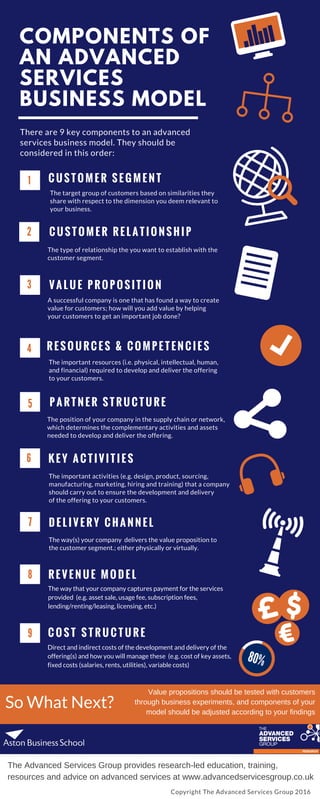Components of an Advanced Services Business Model
- 1. 1 C U S T O M E R R E L A T I O N S H I P A successful company is one that has found a way to create value for customers; how will you add value by helping your customers to get an important job done? 2 R E S O U R C E S & C O M P E T E N C I E S The type of relationship the you want to establish with the customer segment. 4 V A L U E P R O P O S I T I O N 5 C U S T O M E R S E G M E N T The target group of customers based on similarities they share with respect to the dimension you deem relevant to your business. 3 P A R T N E R S T R U C T U R E The position of your company in the supply chain or network, which determines the complementary activities and assets needed to develop and deliver the offering. There are 9 key components to an advanced services business model. They should be considered in this order: K E Y A C T I V I T I E S The important resources (i.e. physical, intellectual, human, and financial) required to develop and deliver the offering to your customers. D E L I V E R Y C H A N N E L The important activities (e.g. design, product, sourcing, manufacturing, marketing, hiring and training) that a company should carry out to ensure the development and delivery of the offering to your customers. R E V E N U E M O D E L The way(s) your company delivers the value proposition to the customer segment.; either physically or virtually. Copyright The Advanced Services Group 2016 6 7 8 COMPONENTS OF AN ADVANCED SERVICES BUSINESS MODEL The way that your company captures payment for the services provided (e.g. asset sale, usage fee, subscription fees, lending/renting/leasing, licensing, etc.) 9 C O S T S T R U C T U R E Direct and indirect costs of the development and delivery of the offering(s) and how you will manage these (e.g. cost of key assets, fixed costs (salaries, rents, utilities), variable costs) So What Next? Value┬Āpropositions┬Āshould┬Ābe┬Ātested┬Āwith┬Ācustomers ┬Āthrough┬Ābusiness┬Āexperiments,┬Āand┬Ācomponents┬Āof┬Āyour model┬Āshould┬Ābe┬Āadjusted┬Āaccording┬Āto┬Āyour┬Āfindings The┬ĀAdvanced┬ĀServices┬ĀGroup┬Āprovides┬Āresearch┬Łled┬Āeducation,┬Ātraining, resources┬Āand┬Āadvice┬Āon┬Āadvanced┬Āservices┬Āat┬Āwww.advancedservicesgroup.co.uk

